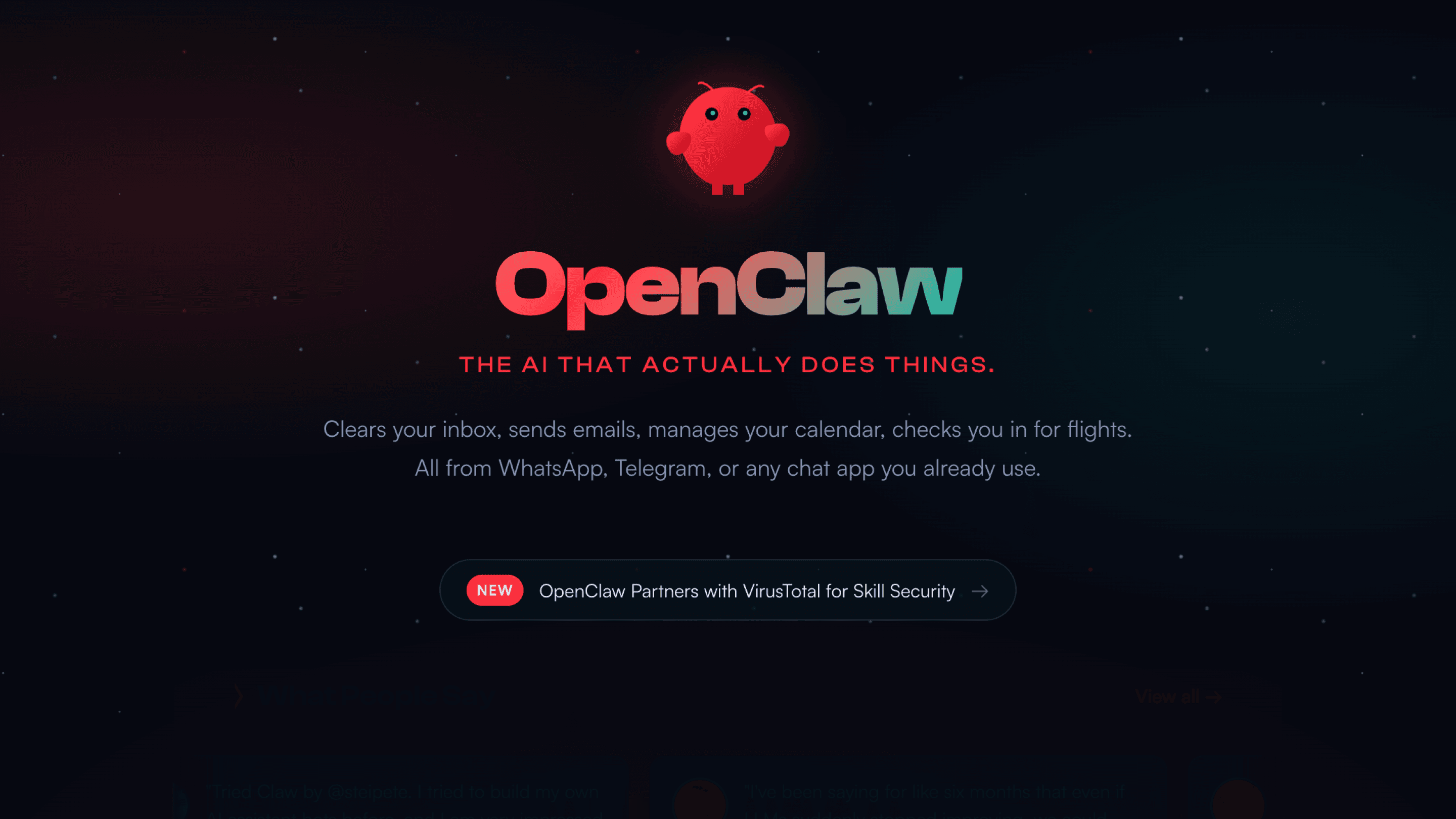Table of Contents
How is AI Making Software Development Easier?
Author

Subject Matter Expert

Date

Book a call
Overview
Some people call this artificial intelligence, but the reality is this technology will enhance us. So instead of artificial intelligence, I think we’ll augment our intelligence.
— Ginni Rometty, ex-chairman and president, IBM.
We have entered an age where artificial intelligence is making rapid, revolutionary changes in software development processes, reducing overall cost and turnaround time. From automating project management to generating designs, writing codes, and detecting bugs, AI is bringing about impactful productivity gains for enterprises of every scale. A Forbes report states that AI technology is expected to show an annual growth rate of 37.3% from 2023 to 2030 across industries.
Through this article, we attempt to understand the role of AI in software development and how companies are leveraging the technology most effectively.
What is AI in Software Development?
When we think of AI in software development, popular models such as ChatGPT come to mind. Yet, these current models can be understood as an evolution or upgrade on the previously existing AI-powered techniques in the development workflow. Millions of developers have already been using GitHub Copilot for automated code generation. And manual processes such as using Stack Overflow to find relevant code have always been around.
While AI technologies in software development have evolved, the underlying concept remains the same — utilizing algorithms and techniques to create intelligent systems that can learn from data, make informed decisions, and perform tasks without explicit programming. Current AI trends and developments are working to make these techniques more efficient, universal, and accessible to programmers.
Benefits of AI in Software Development
The benefits of AI in software development are many, from automating repetitive tasks to generating high-quality, cost and time-efficient results. Here are a few points to summarize its advantages:
- Enhanced Efficiency: When it comes to quickly generating high-quality code, AI-powered tools are helpful. These tools can take over repetitive but necessary tasks such as testing and debugging, significantly reducing development costs and time.
- Improved User Experience: AI-powered software can improve user experience by offering personalized recommendations and intuitive interfaces. By analyzing user data and identifying patterns, AI can help companies in their decision-making processes. A great example is how Netflix utilizes customer data to offer customized recommendations.
- Intelligent Data Analysis: AI algorithms help developers make data-driven decisions during development. Developers can thus create features and add upgrades that are user-centric, bug-free, and improve product quality.
- Reduced cost of production: Using AI significantly reduces the cost of software development. AI makes accurate decisions about resource allocation in the project, reaches target customers using real-time data, and automates manual tasks, which optimizes performance and cuts down overhead costs.
How Does AI Impact Software Development?
AI-powered apps assist developers by writing boilerplate code, providing accurate project plans, automating repetitive tasks, and ensuring secure apps.
- Automated Testing and Quality Assurance: Testing is a crucial step while developing software, and there are several ways of testing code. Developers may find it tedious and time-consuming to repeatedly test their code. Large language models (LLMs) such as Copilot or ChatGPT help save precious development time by quickly testing code for bugs and errors.
- Natural Language Processing (NLP): Chatbots, smart assistants such as Apple’s Siri or Amazon’s Alexa, and voice-activated devices use NLP technology. The technology understands and responds to conversational language, elevating user experience by making it more intuitive and personal. NLP can also be used to generate product designs and targeted advertisements.
- Code Generation: AI tools such as Copilot, Tabnine, or ChatGPT can assist the development process by generating boilerplate code and offering coding suggestions. These tools assist developers by utilizing code from training data. Generative AI integrated into low code-no-code tools will simplify the app-building process for non-developers.
- Systematic Project Planning: AI-enabled project management platforms use machine learning algorithms to enhance collaboration and automate workflows. Optimal resource allocation, automated task assignment, project timeline estimation, real-time insights into projects, identification of bottlenecks, and risk anticipation are some of the features of platforms such as Jira, Forecast, and Asana. Tools such as Sentry or OverOps are also used to predict software malfunctions.
Some Well-known AI Coding Tools
Several AI coding tools have emerged to assist developers in their daily tasks. Some notable tools include:
- GitHub Copilot: An AI-powered code completion tool developed by GitHub in collaboration with OpenAI. Copilot is great at writing Redux code- suppose we are integrating a new API endpoint. Copilot draws context from our code to create accurate services, sagas, constants, and reducers very quickly. Copilot is also good at writing React Native styles. Since it is good with short context code, half of the files in util folders are created with the help of Copilot. Working with dates is also super easy with Copilot.
- ChatGPT: An advanced language model developed by OpenAI, ChatGPT can generate code snippets in various programming languages. ChatGPT also provides programming guidance and answers technical questions. ChatGPT works by understanding context through a series of prompts. The tool leverages vast training data to understand and generate human-like text, making it a valuable resource for developers seeking AI assistance.
- TensorFlow: An open-source machine learning framework by Google that simplifies developing and deploying AI models for mobile apps. TensorFlow provides a comprehensive set of tools and libraries for training and deploying deep learning models, enabling developers to leverage AI capabilities in their mobile applications.
- PyTorch: A deep learning library that provides dynamic computational graphs and various tools to develop AI-powered mobile applications. PyTorch offers a flexible and intuitive interface for building neural networks, making it popular among researchers and developers.
- Keras: A user-friendly deep learning framework that simplifies the implementation of complex neural networks in mobile app development. Keras provides high-level abstractions and pre-built layers, enabling developers to easily build and train deep learning models.
Some Examples of ChatGPT and Copilot in AI-driven Software Development
From converting one coding language into another to optimizing codes, let us take a look at how AI-powered tools are becoming an indispensable part of coding and app development.
- Here is how ChatGPT can convert the following TypeScript code to Python:
This is the prompt used:
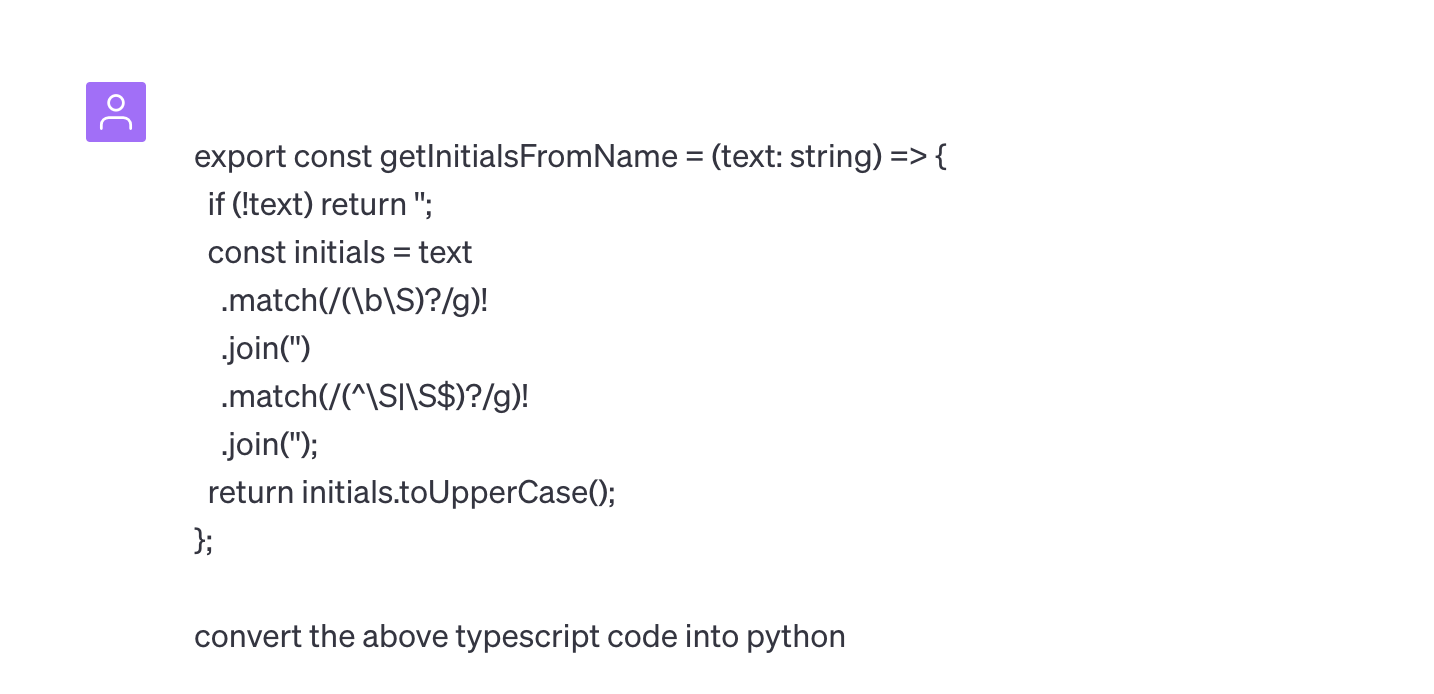
And this is the response we get:
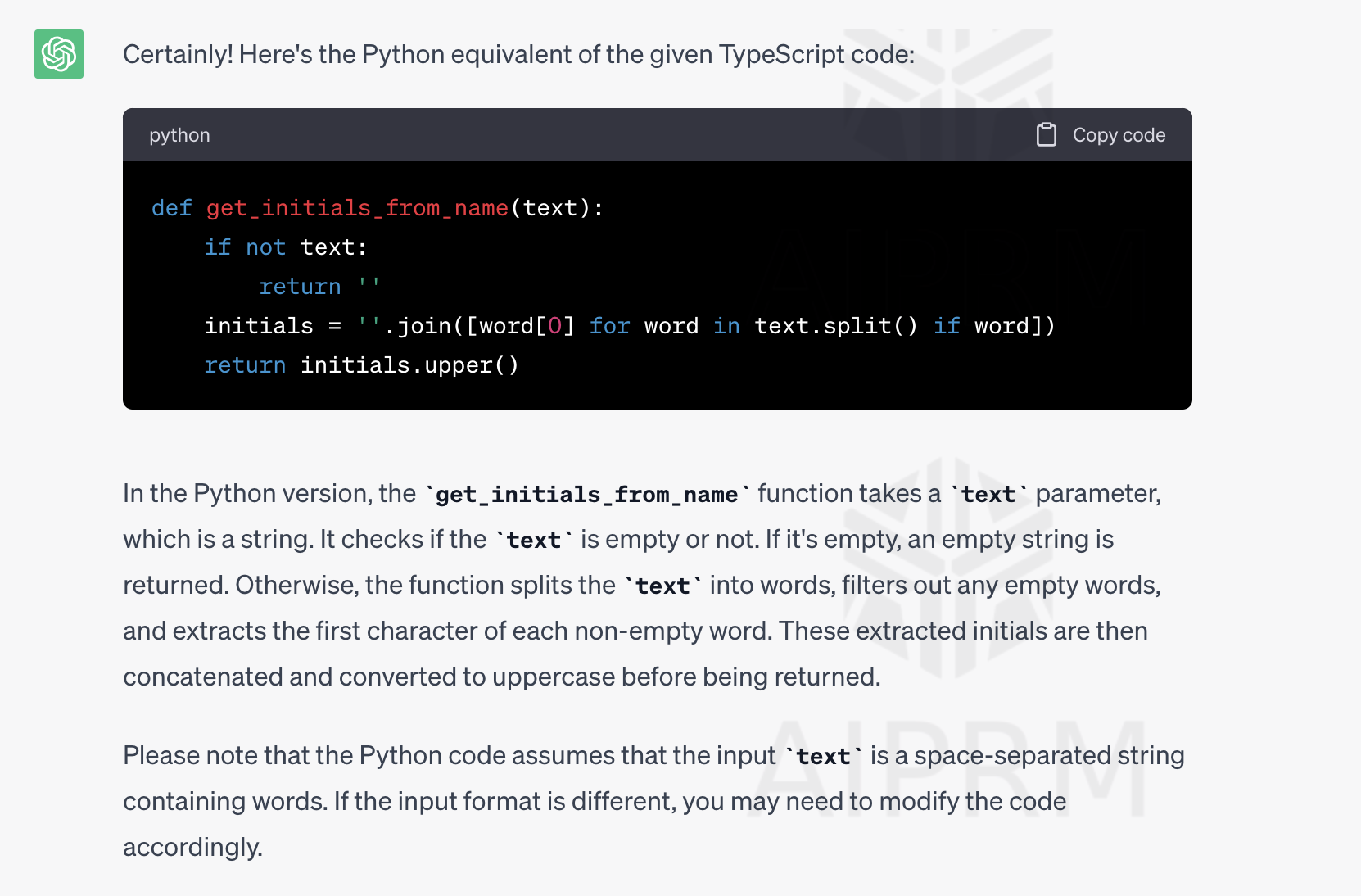
- We can also use tools such as ChatGPT to optimize codes such as the one shown below:
This is the prompt used:
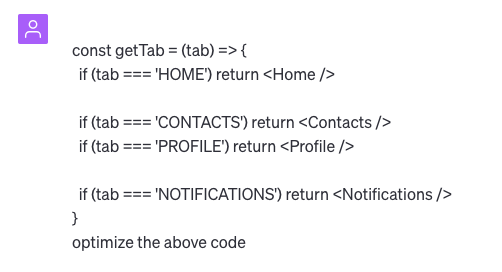
The response we get is shown below:
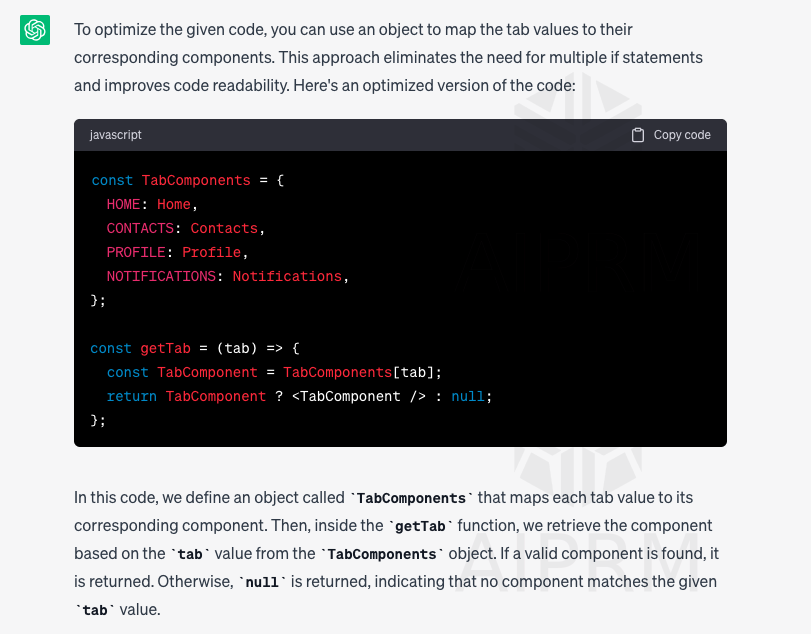
Challenges and Limitations of AI
While AI implementation in software development is advancing at supersonic speed, it is not free from challenges and limitations:
- Data Privacy and Security Concerns: Since AI models are trained on huge data sets, there are some concerns about the source and sensitivity of this data. You may think that the code you got from an AI model is original, but what if it is not? There is also always a possibility of AI-generated bad or flawed code, which could understandably lead to security issues.
- Ethical Considerations: AI-generated information may be unintentionally biased and may sometimes show a lack of transparency and fairness. For example, an AI model may favor one programming language over another. AI-generated code may also need to follow better practices and standards.
- The missing human touch: As far as creativity, critical and intuitive thinking and experienced decisions are concerned, humans are still ahead by leaps and bounds. Even integrating AI into software development processes requires specialized knowledge and skills and being very open to new ways of working.
How Can Companies Tackle These Challenges?
Some measures can be taken to ensure that the future of AI implementation in software development looks more promising.
- To ensure that data privacy is maintained and sensitive information does not get misused, AI-generated data and codes should comply with legal and ethical regulations to protect user trust. The data used for training AI models should have a proper permissive usage license.
- A workaround to the ethical issues would be training AI models on diverse datasets and monitoring them regularly for biases. Remember that the quality of data produced by AI is only as good as the data it is fed.
- Building a smooth collaborative experience between developers and AI-powered tools is necessary. Rather than replacing human skills, AI-enabled assistance augments our decision-making capabilities and quickly produces high-quality results.
- Developers should be informed about the ethical implications of AI-generated data, and the best practices to follow while implementing the technology.
Companies can collaborate with experienced AI development partners specializing in AI implementation, ensure robust data privacy measures and ethical AI development practices and provide access to skilled AI professionals.
What Does the Future Look Like for AI in Software Development?
As AI technologies evolve, we can expect more advanced tools and frameworks to streamline the software development process, enhance app intelligence, and improve user experiences. AI will play a crucial role in automating mundane tasks, enabling developers to focus on innovation and creativity.
Additionally, AI-powered systems will become more adept at understanding user preferences, anticipating user needs, and providing personalized app experiences. Developers will have greater confidence in their decision-making processes as AI models become more interpretable and explainable.
How GeekyAnts is Moving Towards AI-powered Digital Transformation
The convergence of human and AI capabilities has opened up a vast array of possibilities when it comes to software development. With AI advancements, developers can create applications that are better, smarter, and more efficient than ever before while also reducing the learning curve for both new and experienced developers.
At GeekyAnts, we are committed to exploring the limitless potential that AI has to offer. By integrating AI technologies into our innovative solutions, we are paving the way towards a new era of digital transformation. Our efforts include not only creating AI-powered tools and platforms but also helping industries identify the areas where AI integration can lead to more efficient workflows. With these initiatives, we are well-positioned to take advantage of and utilize the many benefits that AI has to offer, and we are excited to continue exploring new ways to leverage this powerful technology in the future.
To learn more about how we are utilizing AI to develop optimized workflows and offer better services, read our Press Release article on ANI news: GeekyAnts is moving towards AI-powered digital transformation.
Related Articles
Dive deep into our research and insights. In our articles and blogs, we explore topics on design, how it relates to development, and impact of various trends to businesses.



